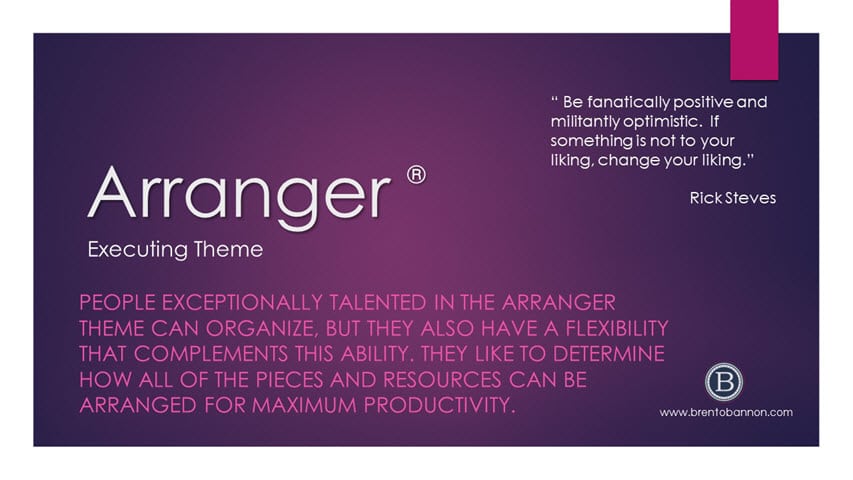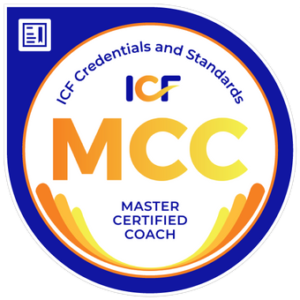
Do you love managing all the variables, aligning and realigning the parts until it all comes together? Is finding the simplest, most efficient way to get things done something you strive for? Do you keep many things in your head at once? Are you flexible and willing to shelve well-laid plans in favor of some brand-new configuration that has just occurred to you? Can you not imagine behaving in any other way? If you answered yes to these questions, then you are an Arranger®.
In whatever you are doing, you are an example of effective flexibility. Whether you are changing plans last minute because something you think is better popped up or considering the right combination of people and resources to accomplish a new project. From the routine to the intricate, you are always flexible enough to find the perfect configuration.
Guidebook author and travel TV host Rick Steves is an Arranger. An Arranger is like the conductor of a symphony; you manage and organize all of the people, resources, and other variables in a project. You are flexible and make great multi-taskers. Steves, for instance, is America’s most respected authority on European travel. He took his first trip to Europe in 1969, and in 1976 he started his business, Rick Steves’ Europe, which has grown from a one-man operation to a company with a staff of 100 full-time, well-traveled employees at his headquarters in Washington State. In 2011, his business was worth nearly $50 million in revenue.
Arrangers can look at a complex situation like travel, a complex problem, or a complex team and arrange it into the perfect configuration. They like to go big. Steves, for instance, has produced more than 50 guidebooks on European travel, as well as America’s most popular travel series on public television, a weekly hour-long national public radio show, a weekly syndicated column, and a successful European tour program.
For entrepreneurs, coaches, speakers, attorneys, technology specialists, and other solopreneurs, going big could be as simple as setting big financial goals or doubling or tripling previous goals. Why not? If you are an Arranger, you have nothing to lose and everything to gain. Arrangers need a clear vision, and there’s nothing better than an income goal expressed as a single number. Don’t waffle. Choose a number and get to work.
Arrangers can sometimes struggle with communicating why you have chosen a particular goal, process, or configuration of people. If this is the case, partner with someone who can help communicate ideas and explain decisions. In addition to clear goals, Arrangers thrive with deadlines and need them to stay on track. Deadlines assure details will not overwhelm you. That said, Arrangers are not fans of routine—you like the excitement of complex projects, so you often overlook or just skip activities that bore you.
Unlike Achievers, who simply outwork the competition, Arranger’s special talent is keeping all of the balls in the air. Arrangers are happiest when part of a team. You offer a natural sense of organization that can keep a group or project moving toward its goal. You love change and often play an integral role when massive change is in the works.
So how do you turn a talent for juggling tasks into income? First, develop a strategy for getting things done. Say you want to attract one new large client this quarter. List a dozen ways to locate, contact, and make your pitch to potential customers, then narrow your strategy to just one or two approaches. Here’s the hard part: Once you have the strategy, stick to the strategy. Rather than changing strategies, challenge yourself to find ways to make even the most successful strategy better. If the strategy doesn’t work, and you get pushback from colleagues or fellow entrepreneurs, encouraging you to try another approach, communicate that your natural flexibility doesn’t mean your priorities and strategy are constantly changing. Your priorities remain the same, but you are simply looking for better ways to implement them.
For some Arrangers, selling is awkward because the process is often not logical. In fact, that first conversation with a new coaching prospect can be downright emotional, and there’s nothing more frustrating than trying to put emotions into a nice straight line and expecting all the fuzzy sensations to stay in place.
What big, clear goal will you set? How will you develop a strategy to scale your business? What people, systems, and connections will you need to monetize your Arranger?
Let’s have a conversation about how to monetize your Arranger. Remember you can schedule your Ask Brent Anything call. Let’s talk about strengths.





